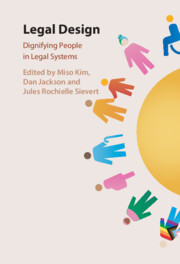Book contents
- Legal Design
- Legal Design
- Copyright page
- Dedication
- Contents
- Figures and Tables
- Contributors
- Foreword
- Acknowledgments
- Introduction
- I Why Legal Design
- 1 Dignifying Law in Design
- 2 Dignifying Design in Law
- 3 Dignifying Imagination in Legal Education
- II What Legal Design Can Do
- III How Legal Design Works
- IV Where Legal Design Goes
- Conclusion
- Index
- References
3 - Dignifying Imagination in Legal Education
from I - Why Legal Design
Published online by Cambridge University Press: 19 December 2024
- Legal Design
- Legal Design
- Copyright page
- Dedication
- Contents
- Figures and Tables
- Contributors
- Foreword
- Acknowledgments
- Introduction
- I Why Legal Design
- 1 Dignifying Law in Design
- 2 Dignifying Design in Law
- 3 Dignifying Imagination in Legal Education
- II What Legal Design Can Do
- III How Legal Design Works
- IV Where Legal Design Goes
- Conclusion
- Index
- References
Summary
This chapter offers insights, stories, reflections, and practical examples of hope amid turbulent times. Given the constant need to reimagine our social-legal systems and teach new legal education strategies, we must codesign solutions with movement leaders and other advocates working to shift narratives and power structures in the legal system. As we seek to reimagine our world within the framework of health, equity, healing, human rights, and transformative justice, we must find new methods to develop students’ imaginations and build strategies to reimagine our social-legal systems in educational institutions. By codesigning solutions with movement leaders and other advocates, we can work to shift narratives and power structures in the legal system and beyond.
- Type
- Chapter
- Information
- Legal DesignDignifying People in Legal Systems, pp. 44 - 58Publisher: Cambridge University PressPrint publication year: 2024

